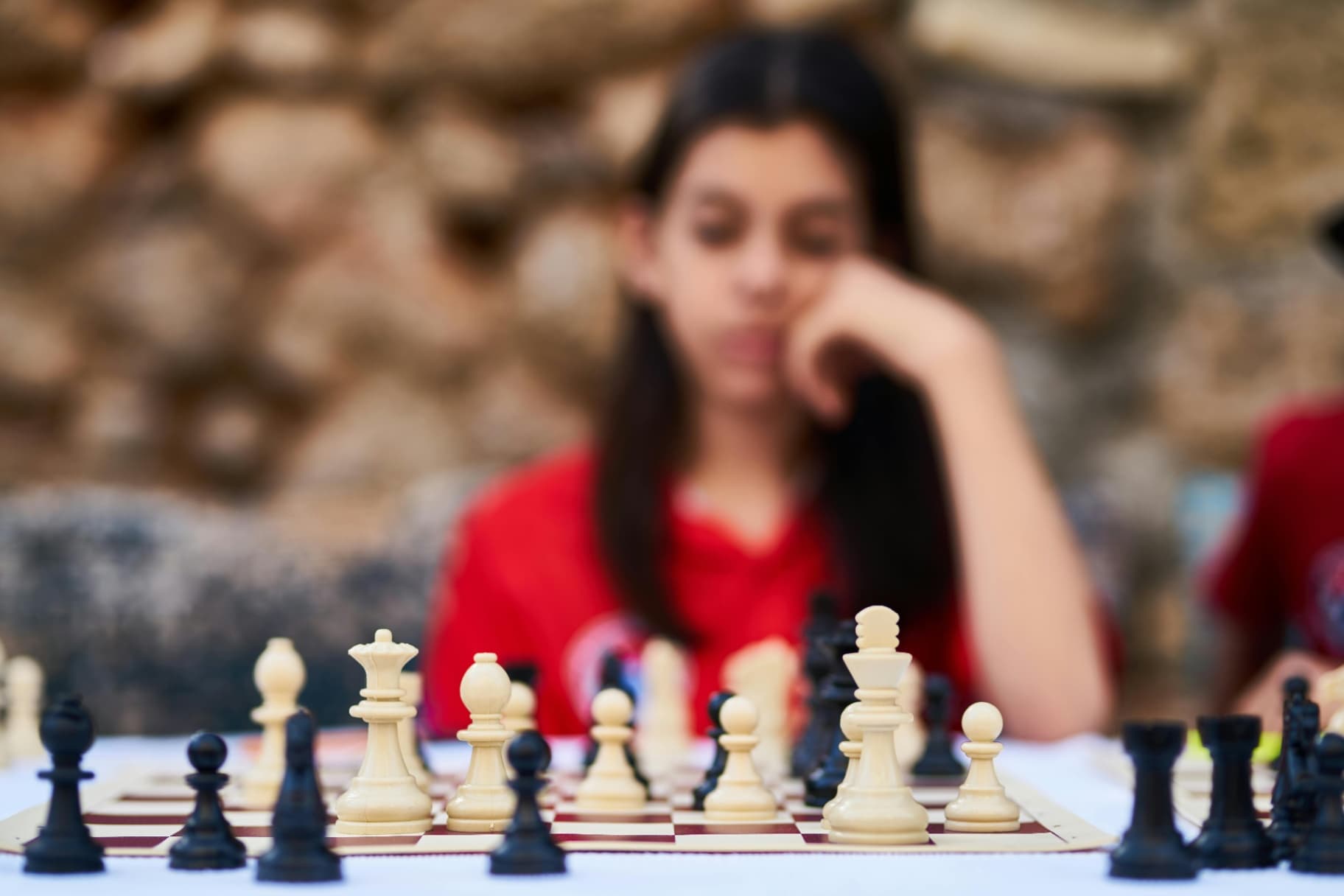Chess Camp 2025 - Learning, Strategy, and Exciting Games

At What Age Can You Start Playing Chess?
Chess is a game that can be started at a very young age, with many children beginning their adventure with it as early as 4-5 years old. Of course, to start, it's enough to just master the basic rules, such as how the pieces move or understanding the game's objective. As a child grows, their ability for strategic thinking also develops, allowing them to move on to more advanced aspects of chess.
With age, a child becomes increasingly better at analyzing moves, predicting subsequent plays, and planning their strategies. It's worth noting that chess is a game that develops regardless of age, which is why chess camps are available for both the youngest children and teenagers who want to improve their skills and compete at a higher level.
Does Chess Increase IQ?
Yes, regular chess playing can have a positive impact on intellectual development, including potentially increasing IQ. Chess requires concentration, logical thinking, the ability to analyze situations, predict opponent's moves, and plan strategies. These skills engage various areas of the brain, which can contribute to improving intellectual abilities.
Studies suggest that playing chess can:
- Improve analytical skills and logical thinking: Players must analyze situations on the board, anticipate opponent's reactions, and make strategic decisions, which develops problem-solving abilities.
- Support memory and concentration: Playing chess helps exercise short-term and long-term memory, as players must remember previous moves, analyze future possibilities, and control many aspects of the game.
- Increase problem-solving abilities: Every chess game is a unique challenge that requires a creative approach to problem-solving, which can lead to an overall improvement in critical thinking skills.
- Develop decision-making ability: Players must make choices based on available information, which teaches them to make decisions under pressure and think long-term.
While playing chess doesn't guarantee an "artificial" increase in IQ, it can certainly influence the development of skills closely related to general intellectual abilities. Regular practice and development of these skills can bring positive effects that may be visible in daily life and learning.
Chess Camps for Children and Youth
CHESS CAMP 2025 for children aged 7-10 in the heart of Masuria. Play like a master! The chess camp in Mrągowo is a unique opportunity for young enthusiasts of the royal game, as well as for those just starting their chess adventure. The camp program combines intensive chess training with a lot of attractions that will make every day full of excitement. Participants will take part in tournaments, simultaneous chess games, and also learn strategies and game secrets under the guidance of experienced instructors. Additionally, campers will have the opportunity to rest and relax by participating in attractions such as swimming in the lake, outdoor games, discos, or karaoke. It's a perfect combination of learning, fun, and competition in one place!
CHESS CAMP 2025 for youth aged 11-16, in the heart of Masuria. Play like a master! The chess camp in Mrągowo is an excellent proposition for youth who want to deepen their passion for chess, while also spending a vacation full of excitement, competition, and fun. Under the guidance of professional instructors, participants will develop their chess skills by taking part in tournaments, simultaneous games, and practicing game theory and tactics. The camp program includes not only intensive training but also many recreational attractions, such as laser paintball, mega chess, kayaking, trampolines, or themed "Beach Parties." It's an ideal opportunity to combine learning to play chess with an unforgettable summer adventure that will surely bring young participants a lot of joy and memories for years to come.
Benefits of Playing Chess
Playing chess brings many benefits, both for children and adults. Here are some of them:
- Development of cognitive skills: Chess engages the mind on many levels, developing analytical abilities, logical thinking, and problem-solving skills. Playing chess requires planning, predicting opponent's moves, and analyzing various scenarios, which contributes to improving concentration and memory.
- Increased decision-making ability: Chess teaches how to make decisions based on analysis, predicting outcomes, and calculating risk. Every move in the game has consequences, which develops the ability to make responsible decisions.
- Improved concentration and patience: Playing chess requires great concentration and patience. Children learn long-term focus on a task, which translates into better results in school and other areas of life.
- Development of problem-solving skills: Chess is a game that presents the player with problems to solve. Each game is a set of problems to solve, which develops creativity and the ability to make quick decisions.
- Strengthening planning skills: Playing chess teaches planning and strategic thinking. Players must anticipate opponent's moves, formulate strategies, and adapt their plans to the changing situation on the chessboard.
- Increased social skills: Playing chess is an excellent opportunity to learn cooperation, adherence to rules, and etiquette. Participation in chess tournaments allows for meeting other enthusiasts of the game, which fosters new acquaintances.
- Stress reduction: Despite its competitive nature, chess can also serve a therapeutic role. Concentration on the game helps to forget about daily problems, relaxing the mind and reducing stress levels.
- Improved academic performance: Research shows that children who play chess often achieve better academic results, especially in math and languages. The development of logical thinking and problem-solving skills has a positive impact on other school subjects.
- Long-term intellectual benefits: Playing chess is one of those activities that engages the brain throughout life. As a result, it develops intellectual abilities and also slows down the aging processes of the brain.
Chess is not just a game, but also a way for personal, intellectual, and social development. Thanks to it, children and adults learn valuable skills that are applicable in many other areas of life.
Why Send Your Child to a Chess Camp?
Sending your child to a chess camp is an investment in their intellectual, emotional, and social development. Here are a few reasons why it's worth making this decision:
- Development of cognitive skills: Chess is a game that engages the mind on many levels. Children learn to plan, analyze, predict opponent's moves, and solve problems. It's an excellent exercise for logical thinking, concentration, and memory.
- Increased self-confidence: A chess camp gives a child the opportunity to compete and win, which increases their self-confidence. Achieving successes, even small ones, in the game helps build a sense of self-worth and motivation for further development.
- Activities under the guidance of professionals: At chess camps, children are guided by experienced coaches and instructors who not only teach how to play chess but also provide valuable tips on strategy, concentration, and solving difficult problems. Children learn from the best!
- Motivation for learning and independence: Children at a chess camp develop their skills, and competition with other participants motivates them to learn and improve. Working on new strategies and analyzing their mistakes shapes their independence and ability to solve problems on their own.
- Increased social skills: A camp is also a time for making new friends. Children learn cooperation, healthy competition, adherence to rules, and fair play. Group activities, shared games, and chess tournaments help develop social and communication skills.
- Learning to cope with stress: Playing chess teaches children how to deal with pressure and stress, especially during competition. The ability to control emotions in difficult moments is valuable not only during the game but also in everyday life.
- Combining learning with fun: A chess camp is not just intensive training and competition, but also a lot of additional attractions. Sunbathing, outdoor games, evening campfires, or discos ensure that the child not only develops their chess skills but also has the opportunity to relax and have fun.
- Long-term benefits: Chess develops skills that are useful throughout life. Thanks to a chess camp, a child will learn to plan, analyze, and make conscious decisions. These skills have a positive impact on learning, personal development, and future life challenges.
- Preparation for competitions: A chess camp is an excellent opportunity to prepare for chess competitions and tournaments. The child not only improves their skills but also gains experience in competition, which is invaluable for future chess achievements.
Sending your child to a chess camp is an investment in their intellectual, emotional, and social development. It's not just a chance to learn the royal game, but also to learn valuable skills that will serve them throughout their lives.
See also:

